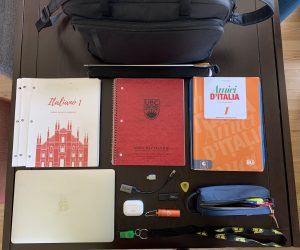Hi everyone, my name is Mark Pepe. I was born and raised in Vancouver, British Columbia. I have been teaching elementary music for the past seven years, but this year I have begun teaching modern languages in high school.
I am currently teaching Italian, I also taught French last year, and one unit in every text book always wants to know what in our bag, “dans ma sac il-y-à” or “nello mio zaino ci sono.” I finally get to answer this question! In this Herschel messenger bag there is:

- Apple MacBook Pro
- AirPods Pro
- Whistle
- Vater musicians ear plugs
- Pencil case with pencils, pens, highlighters, pencil sharpener
- HDMI to USB-C adapter
- USB-A to USB-C adapter
- USB drive
- Guitar pick
- Amici d’Italia Teachers edition 1 and 2
- Amici d’Italia Italiano 1 to 3 student work books
- UBC notebook
- Conductors baton
- Not shown, but there’s usually an opera piano vocal score
Let’s start with the actual text books that I have in my bag, Amici d’Italia Teachers Edition and Italiano 1 – 3 student workbook. These text books which contain the “authoritative” rules of how to read, write, speak, and listen to the Italian language. They also represent my Italian upbringing, a culture that I love, my passion for language, twenty years of studying and performing Italian opera, and my career as an educator. Teaching those courses bring everything together. Burnaby North Secondary, where I work, is the only school in the district to offer that course because of the large Italian community in the neighbourhood.
To digress for a moment, I want to share the lesson I taught last week; I like to include cultural presentations of history, music, and such. Dante Alighieri, the author of La Divina Commedia, wrote in vulgare, the vulgar street language of medieval Florence. Usually, latin would be used for published works. The language that Dante used was then used by Bocaccio and Petrarch in their works like the Decameron and Canzoniere. This vulgar street language of Florence eventually became the official Italian language once Italy unified.
My MacBook and my AirPods are important “text technologies” in my bag that facilitate communication. For personal use, I use these to for work, listen to podcasts, listen to audiobooks, and watch videos. For work, I send and receive assignments, grade student work to log in an Excel spreadsheet, and listen and watch student dialogues and monologues. I thought of Postman (1992) with his point of the seemingly harmless practice of assigning marks and grades. Also, I feel like a computer technology winner, I could log my grades in a paper log book, but the magic of Formulas in Excel allow me to calculate grades instantly.
The earplugs and the baton indicate that on top of written and oral language I also have musical literacy. I bring these around for the days when I am a teacher-on-call. I could be conducting concert bands, jazz bands, or elementary music (which is why the earplugs are very important!).
The conductor’s baton represents someone who has an extensive musical education and experience. One usually sees a maestro waving the baton in front of an orchestra. Scholes (1992) writes about the etymology of canon, and giving one of its many meanings, the French use it as “the word for the law and sacred texts” (p. 140). A true maestro, there aren’t many, knows the musical canon very thoroughly, and the orchestra looks to the maestro for a musical interpretation that true to the sacred text, or law, of the orchestral score. The conductor’s baton is a signifier that the one who holds it is on their path to becoming a maestro, or already is one.
The narrative produced by the image of my bag contents does coincide with what I outwardly project, I think. Those text books show my passion for language and education, the MacBook and AirPods show my love for technology, but the whistle is out of place. That’s for when I have to be a teacher-on-call for P.E. class!
25 years ago, this bag would have a Sony Discman with over ear headphones, clothing for soccer and football practice, a script or musical score for drama class, and no text books because those just would have been left in my locker. My priorities at the time were sports and drama class.
I feel that an archeologist would not be surprised to find my laptop, earbuds, and adaptors, but they would probably be surprised by the UBC notebook. Even though I keep all my work materials on my laptop, I still use a notebook for my lesson plans. Writing helps me sort out my thoughts, and give me the ability to quickly jot down a note immediately.
This was an excellent task that allowed me to think about how I use the contents of my bag. There really is a lot of meaning behind the objects that we carry with us.
References
- Postman, N. (1992). Technopoly: The surrender of culture to technology (1st ed.). Knopf.
- Scholes, R. (1992). Canonicity and Textuality. In Introduction to Scholarship in Modern Languages and Literatures, 2nd edition. Ed. Joseph Gibaldi. New York: Modern Languages Association of America.